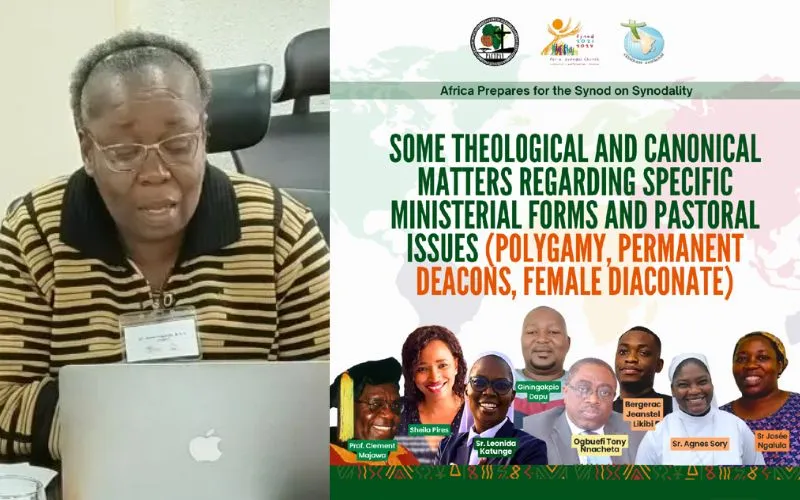
A majority of victims of abuse in the Catholic Church are women, a Congolese Theologian has said, noting that ordination of more female deacons will see “women look after their fellow women.”
According to Sr. Josée Ngalula, involving men in spiritual accompaniment on issues that touch on women's intimacy “opens the door to abuse”.
In her address at the eighth session of the ongoing synodal conversations, the member of the International Theological Commission reminded participants at the session that women's diaconate is part of the traditions of the Catholic Church.
“In the Church in Africa, do we need women who have the permanent diaconate? Yes,” Sr. Ngalula said.
She added, “When we see the many abuses that are denounced in the Catholic Church today, the vast majority of victims are women and children. And this obliges us to multiply female ministers, women's ministries, permanent ministries, ministries that are ordained precisely so that women look after women.”
“It is not normal for men to be involved in spiritual accompaniment and other ministries that touch women's intimacy. It opens the door to abuse,” the member of the Religious of Saint Andrews said at the July 26 event.
Participants at the palaver that the Pan-African Catholic Theology and Pastoral Network (PACTPAN) organized in collaboration with the Conference of Major Superiors of Africa and Madagascar (COMSAM) explored the topic, “Some Theological and Canonical Matters Regarding Specific Ministerial Forms and Pastoral Issues”.
The palaver is the latest in the series of digital palavers that theologians and other experts in Africa have organized to deepen the understanding of the Synthesis Report that came out of the October 2023 session of the Synod on Synodality.
The Synthesis Report highlighted the need to “continue to deepen the theological understanding of the relationship between charisms and ministries in a missionary perspective”.
The July 26 conversations were hinged on whether Africa needs new ministries in the Church or if the present pastoral structure in Africa should be maintained.
Sr. Ngalula said that the question of female permanent deacons is part of a process that began at the Second Vatican Council.
“Many people are unaware that the deacons to whom we are now accustomed, that is, the aspirants to the priesthood who are deacons for a few months before ordination to the priesthood, do not have the form of diaconate, which we have inherited from the apostles,” she said.
“The deaconate in the early Church was a permanent diaconate, and it was the circumstances of Western history that made it a provisional stage before the priesthood. The Second Vatican Council decided to restore permanent diaconates, but only for men,” said the Congolese Nun who researches African theologies, Christian lexicology in African languages, and religion and violence.
She said that after the close of the Second Vatican Council of theologians, some “feminists” reminded the magisterium that in the early Church, there were also women permanent deacons.
Following the feminists’ plea, a commission was set up to investigate the history of the early Church, Sr. Ngalula said, adding that the commission discovered that it was true that there were permanent women deacons in the early Church.
“Feminists asked the same question in the time of Pope John Paul II, and for the second time, a commission was set up to verify the story,” she recalled.
The Congolese Catholic Nun said that even after the commission came to the conclusion that it was right, that there had been permanent women deacons in the early Church, the investigation was closed for a second time.
A commission in the ongoing pontificate of Pope Francis has come to the same conclusion as the first two commissions, verifying that indeed, there were women deacons in the early Church, Sr. Ngalula said, adding that from “feminists” the issue of female diaconates has become a concern of Catholic Bishops’ conferences.
“It is very important to be aware that it's not a question of the whims of feminists; it's not a question of fighting for power in the Church, it’s a question of respecting the tradition of the Church and we, in Africa, love tradition,” she said.
In May, Pope Francis once again expressed his opposition to the ordination of female deacons.
In what has been his consistent firm stance against women becoming Clergy, the Holy Father told CBS News anchor, Norah O’Donnell, that he was not open female “deacons with Holy Orders”.“But women have always had, I would say, the function of deaconesses without being deacons, right?” Pope Francis said, and added, “Women are of great service as women, not as ministers, as ministers in this regard, within the holy orders.”
He went on to emphasize the
importance of women’s roles in the Catholic Church, describing them as
“the ones who move changes forward, all sorts of changes.”
